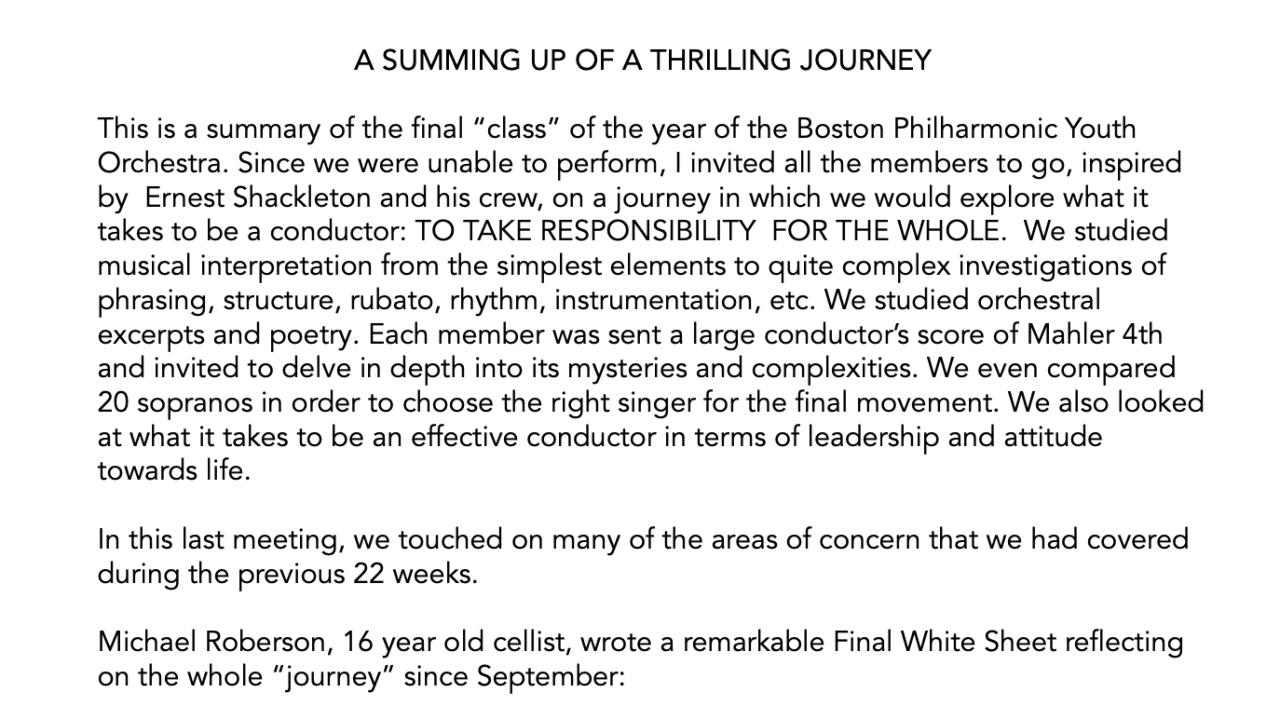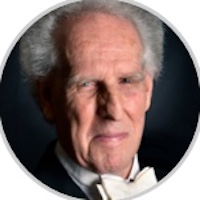BPYO - Final Class - Recap

A SUMMING UP OF A THRILLING JOURNEY
This is a summary of the final “class” of the year of the Boston Philharmonic Youth Orchestra. Since we were unable to perform, I invited all the members to go, inspired by Ernest Shackleton and his crew, on a journey in which we would explore what it takes to be a conductor: TO TAKE RESPONSIBILITY FOR THE WHOLE. We studied musical interpretation from the simplest elements to quite complex investigations of phrasing, structure, rubato, rhythm, instrumentation, etc. We studied orchestral excerpts and poetry. Each member was sent a large conductor’s score of Mahler 4th and invited to delve in depth into its mysteries and complexities. We even compared 20 sopranos in order to choose the right singer for the final movement. We also looked at what it takes to be an effective conductor in terms of leadership and attitude towards life.
In this last meeting, we touched on many of the areas of concern that we had covered during the previous 22 weeks.
Michael Roberson, 16 year old cellist, wrote a remarkable Final White Sheet reflecting on the whole “journey” since September:
To Dave, Alfonso, Elizabeth, and Maestro Zander,
My interpretation of orchestra before our experience together was that of a mandatory requirement that had to be filled. To me, being in an orchestra meant simply to play through your part when asked during rehearsals, often on autopilot.
With BPYO however, our experiment of all participants putting themselves into the shoes of a conductor made it impossible for me to “rehearse on autopilot”. Thinking like a conductor every Saturday afternoon taught me more than any music theory class, chamber group, masterclass, or orchestra I have experienced prior. I learned so much: from tempo choices, phrasing while thinking about heavy/light bars, how editors can influence the way music is traditionally played after a composer’s death, how to perform with intensity and expression, how to read an orchestral score, rubato, the Schenker principle, Alexander technique, Mahler’s tragic life and music, one-buttock playing (and much much more) as well as how to go about living life with the weekly assignments, The Art of Possibility readings, and at the start of our experiment, rejecting the downward spiral.
Who would have thought that I would learn the most that I have ever learned about music through a computer screen during a pandemic? During every session, I was completely immersed, not only because of the constant fascinating content but also because of Dave and his camera skills. Oftentimes, zoom meetings can feel a bit stagnant and tend to feel like a lecture, as the speaker stays still, in a box, and speaks. However, Dave’s dynamic camera switching would constantly highlight important events during performances.
Alfonso being alert and one step ahead at all times during the meetings, screen sharing scores, making presentations, and playing orchestral recordings immediately when asked showed a level of professionalism and proficiency with technology that you often don’t see during a typical online meeting. Alfonso also played an instrumental role in the aforementioned weekly assignments and Art of Possibility readings with his email updates. On the off chance that something did go wrong, Elizabeth was there to point it out. She also always had an open line of communication with me throughout the year.
My experience with BPYO felt so fundamentally different from other online classes/meetings. Not only because of the mentioned fascinating content, high production value, and supportive staff and direction, but also because of the engagement from the other students. During the beginning of the year, I had a sense of impostor syndrome due to hearing members of the orchestra perform each Saturday at such a high level. Since then, that feeling has morphed into a sort of inspiration and goal to reach.
To Dave, Alfonso, Elizabeth, and Maestro Zander, THANK YOU for adding light to an otherwise dark year.
Sincerely, Michael
Each of the classes was filmed. Please Click here to download the entire recap.
 Benjamin Zander
Benjamin Zander